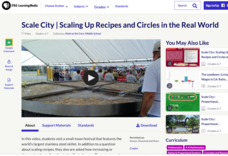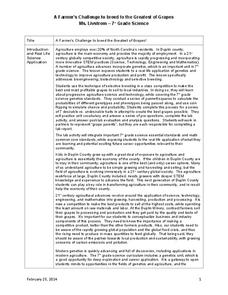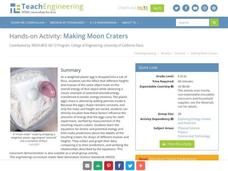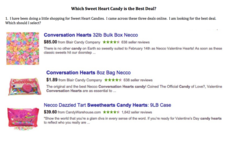PBS
Scale City — Proportional Relationships in the Real World
Strive to determine your stride. Scholars first view an informative video on the Kentucky Horse Park and the 28-feet stride of the Man o' War. They then work together in groups to find the length of their own strides by using the number...
PBS
Scale City — Inverse Proportions and Shadows in the Real World
Bring the resource out from the shadows. Viewers of a short video learn about drive-in theaters and how operators project images onto a large screen. They then perform an experiment to determine the relationship between the distance of...
PBS
Real-World Proportional Relationships: Gender Wage Gap
When will the gender wage gap disappear? Scholars use a provided infographic to see trends in wage gap over time. They use ratios of women's wages to men's wages to determine which decades had the greatest change in the wage gap. The...
Corbett Maths
Direct Proportion
Direct change by finding the constant. Using two known values within a direct proportion, the resource shows how to find the constant of proportionality. Once individuals do that, they then find any value given the other. The video works...
PBS
Scale City — Scaling up Recipes and Circles in the Real World
What a great big skillet you have. The resource introduces the class to the world's largest stainless steel skillet. The class creates a model of the skillet and a typical 12-inch skillet and compares the relative sizes of their areas....
101 Questions
Pedestrian Countdown
You won't find yourself racing the clock on such a great task. Scholars use video information to predict the time left on a crosswalk signal after a pedestrian crosses. The video shows the time left on the counter, and individuals must...
101 Questions
Gas Light
You don't want to leave any learners stranded! Explore ratios using an analysis of gas mileage and distance. Given a scenario, individuals must determine if a car has enough gas to make it to the next gas stop.
101 Questions
Ants Marching
Your classroom will be rockin' during an toe-tapping lesson! Dave Matthews inspires a lesson on proportions as youth listen to a song and predict its length. Lesson materials provide learners with ordered pairs that mark the time slider...
Kenan Fellows
A Farmer’s Challenge to Breed to the Greatest of Grapes
What does your class know about GMOs? Are they savvy to selective breeding? Challenge young minds to engineer the greatest crop of all time using a hands-on genetics unit. Learners discover the good and bad details of selective breeding,...
101 Questions
Lightning then Thunder
Conquer your fear of thunder and proportions. After viewing a video of lightning and thunder, scholars consider how far away the storm is from the recorder. This obviously requires the use of proportions and rates.
101 Questions
A Penny Saved is a Penny Earned
How many pennies can you save in a lifetime? One individual knows the answer! A video presentation of a question asks scholars to determine how many pennies a bank customer has saved since he was a teenager. They know the total weight of...
Teach Engineering
Exploring Energy: Energy Conversion
The energy is not really lost, it is just converted to a different form. Pupils learn about the conversion of energy in the fifth segment of an energy unit with six parts. Learners develop an understanding of the conservation of energy...
Teach Engineering
Making Moon Craters
Create an egg-citing study of energy. Pupils investigate the effect of height and mass on the overall amount of energy of a falling object. The fourth segment in a six-part series on energy uses a weighted egg falling from different...
Teach Engineering
Exploring Energy: Kinetic and Potential
The potential of the energy in the class is moving. The third segment in a six-part unit on energy provides a deeper understanding of kinetic and potential energy. Learners understand the relationship between mass, speed, and energy and...
Benjamin Banneker Association
Celebrate Benjamin Banneker
Inventor, astronomer, surveyor, mathematician, clock maker. Learners celebrate the life of Benjamin Banneker by building creative analog clocks, making scale models, and solving problems related to surveying. The activities model the...
Yummy Math
Sweethearts Candy
Sweethearts® candies are a beloved Valentine's Day treat—so much so that eight billion hearts are produced every year around the world! Learners use number sense reasoning and critical thinking to solve nine word problems about the...
Yummy Math
Which Sweet Heart Candy Is the Best Deal?
Get the most Valentine's candy for your money with a fun math activity! After examining three deals for buying candy hearts in bulk, young mathematicians decide which deal is the best and use bar graphs to demonstrate their claim. They...
Yummy Math
Valentine’s Day = Roses
Roses are red, but did you know that some are lighter while others are darker? Scholars read an infographic to decipher the fraction and percent of rose color and their country of origin. They go on to make comparisons and estimate while...
NOAA
A Day in the Life of an Ocean Explorer
What's life like aboard an ocean exploration vessel? Junior oceanographers examine the important role of communication in ocean research in lesson plan two of a five-part series from NOAA. The materials introduce the class to life...
NASA
What's the Frequency, Roy G. Biv?
While all light travels at the same speed, each color in the visible light spectrum contains a different wavelength and frequency. Scholars determine the relationship between frequency and wavelength as they complete the activity. They...
CK-12 Foundation
Graphs of Linear Functions: Line Designs
Designs from lines are sublime. Scholars create colorful designs by connecting points on an interactive coordinate plane. They answer questions about slope and quadrants based on their designs.
NOAA
A Matter of Density
Larvae transportation on the New England seamounts is based on the density of the water. Scholars calculate density and graph salinity versus temperature to better understand the distribution of organisms in a water column....
California Education Partners
Photos
Why do all sizes of pictures not show the same thing? Class members analyze aspect ratios of various sizes of photos. They determine which sizes have equivalent ratios and figure out why some pictures need to be cropped to fit...
California Education Partners
Miguel's Milkshakes
Moooove over, there's a better deal over there! The fourth segment in a series of eight requires individuals to determine the best unit cost for milk. Scholars calculate the least amount they can spend on a particular quantity of...

























